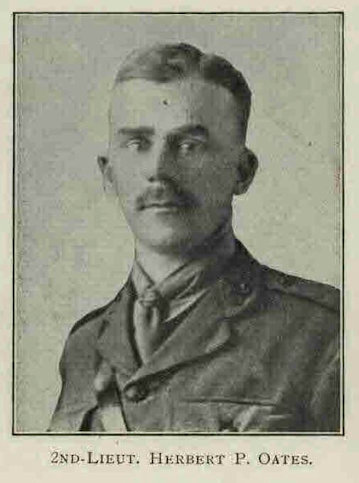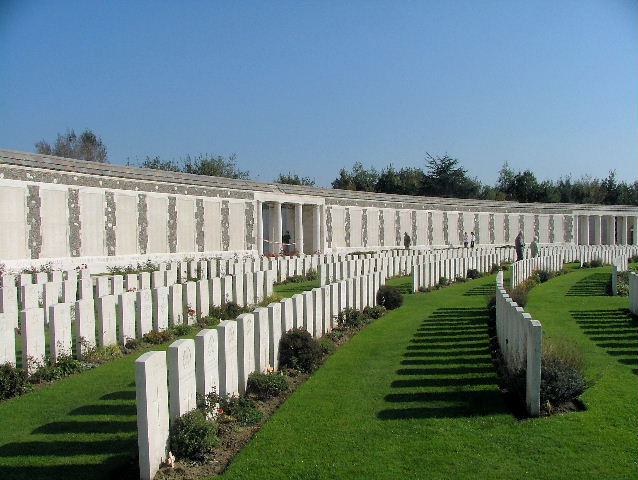Name
Herbert Prudent Oates
Conflict
First World War
Date of Death / Age
20/09/1917
Rank, Service Number & Service Details
Second Lieutenant
The King's (Liverpool Regiment)
5th Bn.
Awards: Service Medals/Honour Awards
Not Yet Researched
Cemetery/Memorial: Name/Reference/Country
TYNE COT MEMORIAL
Panel 31 to 34 and 162 and 162A and 163A.
Belgium
Headstone Inscription
NA
UK & Other Memorials
St Edmunds College Memorial, Old Hall Green
Biography
The following text was transcribed from The Edmundian (1914-1919) – The contemporary magazine of St Edmund’s College:
Herbert Prudent Oates was the eldest son of the late Austin George Oates, K.S.G., Private Secretary to Cardinal Vaughan, and of Odilia née Plettinck, daughter of M. le Docteur Prudent Plettinek, Burgomaster of Menhbeke, in West Flanders and Officer of the Order of Leopold. He was baptised by Cardinal Vaughan, whose name was given to him.
Herbert Oates entered St. Edmund’s College in September, 1898, beginning at St. Hugh's. It is not too much to say that from those early days onwards, without a break, he showed the quickness to learn, and the power of appreciating what he has learnt, which never left him.
With his honesty and directness of mind there was that which made them supreme, valuable and effective, a like honesty and singleness of character. He was truly appreciative, and therefore eminently serious and eminently humorous: he would read the classics as one to whom they were living, and he would, with all his seriousness diverted. and with a few strokes of pen or pencil, caricature the central figure into “something rich and strange." And those who knew him knew and loved both his great seriousness and his humour. which was as arresting as one of his sketches.
This same simplicity shewed itself outside the ‘study-place' and rooms: he was, as his contemporaries will remember vividly enough, an uncompromising full-back on the football field, and on the cricket field a ‘slogger' in all simplicity.
He stayed at the College until July, 1905, when he decided that the vocation to the Priesthood, regarding which he had, in his own straightforward way, taken the counsel of God and man, was not for him.
He left behind him at St. Edmund's, among those who knew him well, a memory of honesty and loyalty, of strength of will and strength of intellect and St. Edmund's left in him a deep-seated affection which be never forgot.
From St. Edmund's he went to St. Bede's College, Manchester, for two years, where his openness was not lost on the northerners, and where as always, his talents won for him the continuous academic successes which had marked his years at St. Edmund's. After leaving St. Bede's he matriculated at London University, and eventually joined the staff of the Educational Department of the London County Council, and it was from that work that he joined the Artists' Rifles in 1915.
He was seldom demonstrative regarding his own interior state, and the little he said at the time is probably the best testimony to what he really did in shouldering the strange burden of war.
There were many things which urged him to await the final command of his country, most of all perhaps the claims of the best of mothers to his company; but he saw and accepted his duty, and it was to her that he declared that he had no longer any choice.
When his training had begun he was his own simple self, in his interest in drills, kit and the rest. His reading of Homer, which he had continued with one of his classmates of St. Edmund's, gave place, as it has done with his friend, to the reading of military text books. He took his greatness with him into the Army, and he had will enough to turn both mind and body to the new work, so that there should be no divided interest, no half measure. And through it all, as from his boyhood, there ran in the weekly letter, that true sign of a sterling young man, the inexpressible love he bore to his mother.
He had one leave, spent with his mother and brother, very shortly before his death, lasting consolation to them; and he was his own dear self with the same heart and mind, the same seriousness and humour, that he had in his St. Edmund's days.
When the advance of September 20th had begun, we knew that the King's Liverpool Regiment had been engaged, and later we knew that Herbert, loyal and true, had risen up, ‘when the rosy fingered dawn appeared,' and had died with his men.
Acknowledgments
Jonty Wild, Di Vanderson, The Edmundian (1814-1819) – The contemporary magazine of St Edmund’s College



